#peder severin kroyer
Explore tagged Tumblr posts
Text
Writing Worksheets: Magic & Rituals

MAGIC
The People
What are people called who practice it?
Is everyone born with it?
Through ritual or training?
Is it considered "normal"?
Is everyone born with an equal share of it?
How long does it take to acquire?
Is there a magical elite?
Does it manifest from birth?
Why do people wish to acquire it?
Does it change in any way depending on…
Age?
Race?
Or gender?
Mechanics
How is it summoned?
Does it require additional resources?
Are there limits to its use?
Why is it necessary to the world?
What is its source?
What are the consequences of using it?
Is there a limited amount of it in the world?
Are there dangers to using it?
Does it change according to location?
What is it called?
What does it make easier?
What does it make more difficult?
The World
Has it always been in the world?
What events led to its discovery?
What lore has grown up around its use?
Why is it considered magical?
Is it "good" or "evil" or both?
Are there institutions that regulate its use?
What objects or symbols are associated with it?
Does it have a spiritual aspect?
How does it shift the balance of power?
How does it influence politics?
How does it influence human relationships?
How does it influence the environment?
RITES & RITUALS
Rite—a ceremonial act or action Ritual—the established form for a ceremony
Name of rite or ritual:
What transition does this rite or ritual mark?
Is it difficult or painful?
Who undergoes the transformation?
Is the rite or ritual mandatory?
What is the nature of this rite or ritual?
Is it public or private?
Is it dangerous?
Does it involve a sacrifice?
Is there a prize?
What happens if it succeeds?
What happens if it fails?
Who officiates?
Where does it take place?
How long does it last?
Is there a formal ceremony?
Does it change the individual's status in society?
Is it possible to distinguish those who have passed?
Source ⚜ More: On Fantasy Writing References: Plot ⚜ Character ⚜ Worldbuilding
#writing reference#magic#fantasy#writeblr#spilled ink#dark academia#worldbuilding#writers on tumblr#poets on tumblr#writing prompt#literature#poetry#writing tips#writing inspiration#template#writing ideas#creative writing#fiction#novel#lit#light academia#peder severin kroyer#writing resources
203 notes
·
View notes
Text

Summer Evening at Skagen. The Artist's Wife and Dog by the Shore, 1892.
Peder Severin Krøyer (Danish, 1851-1909)
16 notes
·
View notes
Text
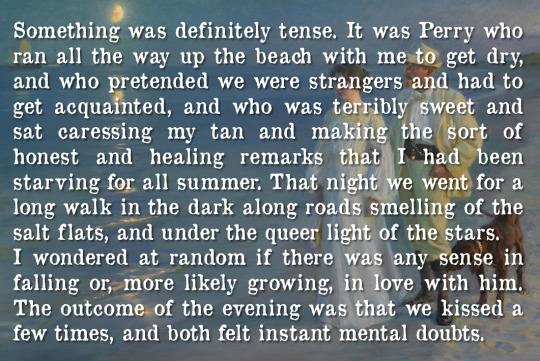
Sylvia Plath, aged 18
#sylvia plath#peder severin kroyer#quotes#literature#words#spilled ink#writing#letters#Tuesday 11 September 1951
2 notes
·
View notes
Text
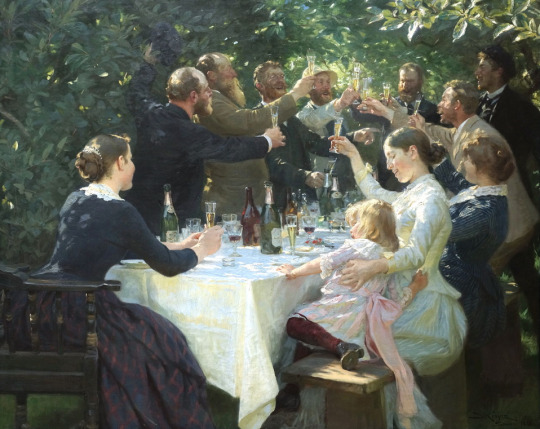
Hip, Hip, Hurrah! Artists' Party at Skagen - Peder Severin Kroyer
22 notes
·
View notes
Text
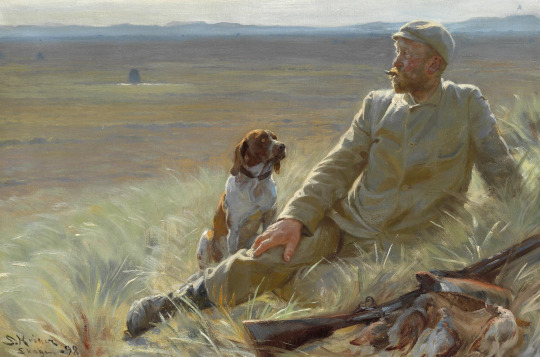
Peder Severin Krøyer (1851-1909) - Degn Brøndum sitting in the dunes with his hunting dog
Oil on canvas. Painted in 1898.
21.7 x 31.9 inches, 55 x 81 cm. Estimate: DKK 1,500,000-2,000,000.
Sold Bruun Rasmussen, Copenhagen, 18 Sept 2023 for DKK 1,700,000 + B.P.
The painting can be considered as a preparatory work for Krøyer's larger painting Skagens jægere (The Skagen Hunters) from 1898, and is located at ARoS, Aarhus Art Museum.
Degn Brøndum (1856-1932) was a merchant, innkeeper, hotel owner, co-founder of Skagens Museum and brother of Anna Ancher. Around 1880, he took over Brøndums Hotel in Skagen after his father.
I like the intensity of the dog's gaze. A proper dog.
23 notes
·
View notes
Text

Peder Severin Kroyer, Hip Hip Hurrah (1888), Detail
8 notes
·
View notes
Text
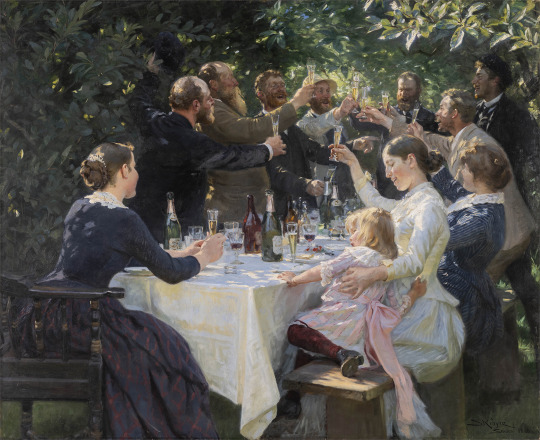
source: @artextual
Hip, Hip, Hurrah! Artists’ Party, Skagen, (1887-1888), oil on canvas by Danish painter Peder Severin Kröyer, Gothenburg Museum of Art.
6 notes
·
View notes
Text
Tipp: Impressionismus im Norden - Hannover
22. November 2024 bis zum 4. Mai 2025 im Landesmuseum Hannover Wie ein frischer Wind wehte der Impressionismus seit den 1860er Jahren von Frankreich über den ganzen Kontinent – und wirbelte die Kunstwelt des europäischen Nordens auf. In Zusammenarbeit mit dem niederländischen Museum Singer Laren und dem Museum Kunst der Westküste Alkersum/Föhr zeigt das Landesmuseum Hannover, wie die Eigenheiten…
#Anna Ancher#Ausstellung#Föhr#Garten#Impressionismus#Impressionismus im Norden#Isaac Israels#Johan Barthold Jongkind#Kunst#Land#Land Winter#Landesmuseum Hannover#Licht#Lovis Corinth#Manuela Mordhorst#Max Liebermann#Max Slevogt#Museum Singer Laren#Peder Severin Kroyer#Reisen#Stadt
1 note
·
View note
Video
Peder Severin Kroyer «The return of the fishermen», 1885 by Art Therapy by Julianna Via Flickr: Oil on canvas; 150x114 cm.
#Peder Severin Kroyer#art#artists#art therapy#paintings#fishing#portrait of male#scandinavian#seascape#flickr
0 notes
Photo

Marie Krøyer Seated in the Deckchair in the Garden by Mrs Bendsen’s House by Peder Severin Krøyer 1893
1 note
·
View note
Text
Writing Notes: The Moon (pt. 3)

Lunicurrent - related to changes in currents that depend on the moon's phases.
Luniform - moon-shaped.
Lunula - something shaped like a crescent or half-moon; especially the pale area at the base of the fingernail.
Mooncalf - a fool, dolt, monster, or aborted fetus.
Moonglade - the bright reflection of moonlight on a body of water.
Moonraker - the top-most sails on some old sailing ships.
Novilunar - of the new moon.
Plenilunar - of the full moon.
The Moon...
Is the Earth’s only “natural” satellite.
Is moving away from the Earth.
Is 27% the size of the Earth.
Orbits the Earth every 27.32 days.
NOTES
There are 2-5 lunar eclipses yearly.
You would weigh 1/6th of your Earth weight on the Moon.
We only ever see half of the Moon at a time, even at “full moon”.
The light reflecting off the Earth and onto the Moon is called “earthshine” or “earthlight”.
In many languages, as in English, the word for “moon” is cognate with the word for “month”.
It takes the moon 29.53 days to cycle back to the same “visual” phase. This is called a “synodic month”.
A lunar calendar is a calendar based on cycles of the Moon's phases (synodic months), in contrast to solar calendars based on the solar year.
The Moon illusion is an optical illusion which causes the Moon to appear larger near the horizon than it does higher up in the sky.
Sometimes it’s possible to see the moon rabbit, or the shadowy face of the Man in the Moon created by lunar maria.
In the northern hemisphere, when the Moon is waxing, it resembles a letter “D��, and when waning a letter “C”. In the southern hemisphere this is reversed.
About 40% of the Moon is never visible from the Earth. This is referred to as the Dark Side of the Moon, even though it isn’t always dark.
Every month or so, the “old moon” sets for the last time as a sliver in the eastern sky. For about 3 days it travels invisibly alongside the sun until, magically born anew, it appears on the third day at sunset, on the western horizon. This course not only sets the moon in direct opposition to the sun, it also gives rise to various resurrection myths in which the hero spends 3 days in the underworld.
IN THE ARTS
In some myths, the lunar deity is represented as female (Greek, Chinese), while in others it is male (Mesopotamian , Germanic, Japanese).
In mythology, the moon deity is sometimes a friend, ally or consort of the sun deity, and sometimes their enemy.
In many mythical stories, a simple character mistakes the reflection of the Moon for a round cheese.
The Moon is the 18th card of the Major Arcana of the Tarot. It represents the mysterious terrain of the Shadow self, illuminated by the guiding light of the conscious.
Shakespeare calls the moon the “moist star” because it creates the tides, and also casts it as inconstant (because of its phases) and thieving (because it steals its light from the sun).
Georges Méliès shot the first science fiction film, Le Voyage dans la Lune (A Trip to the Moon) in 1902.
The Lunar Society of Birmingham, consisting of eminent 18th century intellectuals, was so named because its members met on nights with a full moon. The moonlight made their journey back home easier and safer.
Beethoven’s Moonlight Sonata was originally titled, Sonata quasi una fantasia, and only acquired its popular name after his death.
Source ⚜ More: Writing Notes & References ⚜ The Moon ⚜ Word Lists
#writing notes#moon#writeblr#spilled ink#studyblr#langblr#dark academia#nature#literature#poetry#writing prompt#words#worldbuilding#creative writing#fiction#lit#light academia#writing prompts#writing reference#peder severin kroyer#writing resources
149 notes
·
View notes
Text
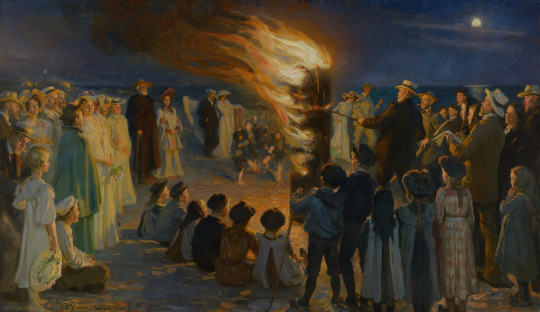
alwh1te:
Midsummer Eve bonfire on Skagen’s beach // P.S. Krøyer // 1906
1 note
·
View note
Text


Peder Severin Kroyer (1851 - 1909)
38 notes
·
View notes
Text

Marie Kroyer by Peder Severin Kroyer (1851 - 1909)
87 notes
·
View notes
Text

Peder Severin Kroyer, 1851-1909, Marie Kroyer
24 notes
·
View notes

